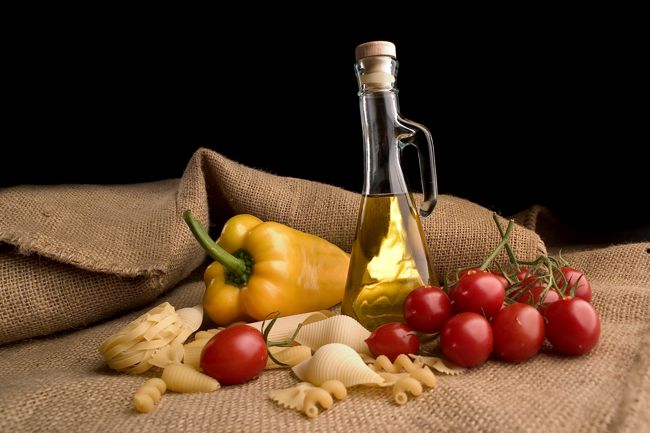
Mediterranean diet
It's a misnomer to refer to a specific diet as the 'Mediterranean diet' as there are numerous countries that border the Mediterranean Sea. Diets vary between these countries and also between regions within a country. Many differences in culture, ethnic background, religion, economy, and agricultural production lead to different diets. Walter C. Willet, MD, professor of nutrition and epidemiology at the Harvard School of Public Health, in Boston, Massachusetts, often gets credit for popularizing the Mediterranean diet in the western world.
One of the characteristics of the Mediterranean diet (1) is a high consumption of fruits, vegetables, bread and other cereals, potatoes, beans, nuts, and seeds. Olive oil is an important monounsaturated fat source. More than half the fat calories in a Mediterranean diet come from monounsaturated fats (mainly from olive oil). Dairy products, fish, and poultry are consumed in low to moderate amounts and little red meat is eaten. Eggs are consumed zero to four times a week, and wine is consumed in low to moderate amounts.
My thoughts on the Mediterranean diet 
The diet is relatively easy to follow. Scientific research supports the diet’s health benefits (4). “Most of the data supporting this diet is epidemiological/population-based” (1). This type of data does not determine cause but shows correlation between variables. I like the fruit, vegetable, legumes, and nuts recommendations. Grains are good for some people but not so good for others, namely those suffering from celiac sprue. Celiac sprue is a hereditary disorder caused by sensitivity to the gliadin fraction of gluten, a protein found in wheat and also used in commercial soups, sauces, ice creams, and hot dogs. For active individuals (particularly strength and power athletes), the Mediterranean diet’s protein recommendations are probably too low. I like the diet’s suggestion of using extra virgin olive oil, which I use in the majority of my diet plans.
'Eat Right for Your Type'
Peter D’Adamo, a naturopathic physician, created 'Eat Right for Your Type.' According to D’Adamo, the body’s reaction to lectins (any of several plant glycoproteins that act like specific antibodies but aren't antibodies in that they aren't evoked by an antigenic stimulus) in foods determines the best diet for that person. Specific blood types require specific diets and certain types of exercise (2). From Aragon’s book Girth Control (1) “type O should eat meat and avoid wheat and most other grains and do vigorous aerobic activity or ulcers and inflammatory/arthritic conditions may occur. Type A needs a vegetarian diet low in fat plus gentle exercise like yoga or golf—or cancer and heart disease may occur. Type B can have the most variation and is the only one who can have dairy. Moderate exercise like swimming and walking is best for type B, who may be prone to slow growing viruses that attack the nervous system. Type AB has most of the benefits and intolerances of A and B and requires calming exercises and relaxation techniques in order to boost immunity.”
My thoughts on 'Eat Right for Your Type'
Science doesn't validate the claims made by this diet. I've never seen any evidence to support D’Adamo’s claims. In fact, science refutes D’Adamo’s claims. Lectins are mostly destroyed by cooking and stomach acids. Harvey Klein, MD, chief of the Department of Transfusion Medicine at the National Institute of Health, says, “We know of no food that attacks and agglutinates blood cells after you ingest it” (3). So there isn't any need to worry about your blood type when choosing a diet.
References
- Aragon A (2007) Girth Control: the science of fat loss and weight gain. 1st edition. Alan Aragon.
- Hale J (2007) Knowledge and Nonsense: The science of nutrition and exercise. MaxCondition Publishing.
- Making Sense of Health News and Popular Diets. Accessed: September 4, 2009. At: http://www.bsc.gwu.edu/dpp/lifestyle/acor/english/makesens.rtf.
- Willett WC, et al (1995) Mediterranean diet pyramid: a cultural model for healthy eating. AM J Clin Nutr 61(6S):1402S–1406S.









1 Comment